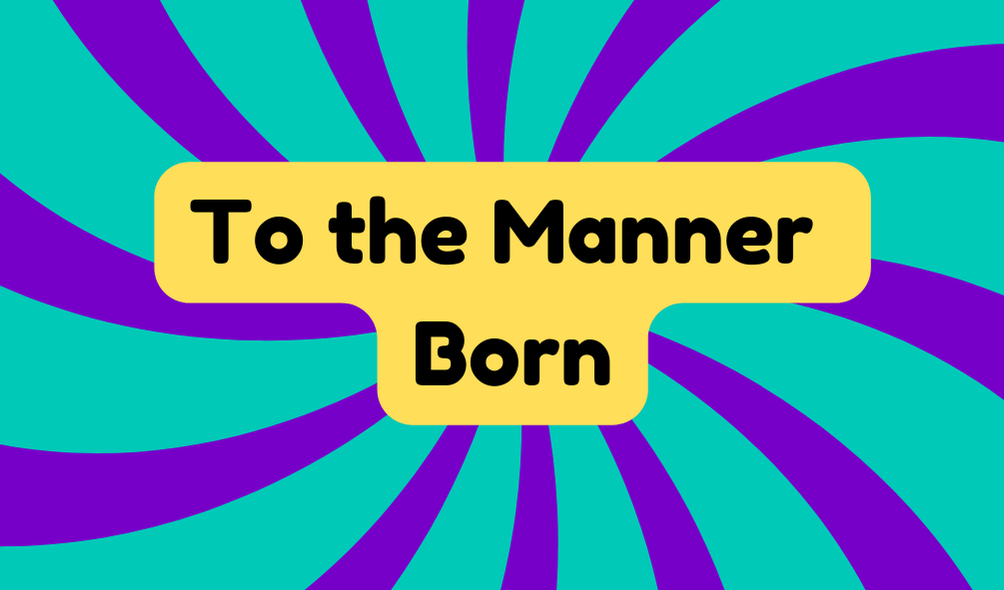The phrase "to the manner born" describes an individual's innate skill or comfort in specific social or professional situations, often due to their upbringing. Originating from Shakespeare's *Hamlet*, it reflects how cultural background influences one's capabilities. While it can suggest privilege, it may also obscure the challenges faced by those lacking such advantages. Understanding these nuances can spark important discussions about equity and social mobility. Further exploration reveals deeper layers to this intriguing concept.
Synonyms
The concept of being "to the manner born" can be unpacked through its synonyms, which often reflect similar ideas about natural suitability or innate familiarity. These terms underscore the significance of cultural familiarity and suggest an inherent advantage in contexts where background shapes capabilities. Recognizing synonyms allows for a broader understanding of the phrase's implications, particularly in the following ways:
- Ingrained Aptitude: Suggests a deep-rooted ability linked to one's background.
- Accustomed Nature: Implies habitual ease derived from familiarity.
- Native Proficiency: Highlights an advantage stemming from one's origins.
The exploration of these ideas sparks essential conversations about societal expectations and accessibility.
Example of Sentences
Crafting sentences that illustrate the phrase "to the manner born" can aid in clarifying its meaning for a wider audience. Usage examples that reveal its cultural implications include:
- She navigated the gala with grace, clearly to the manner born, making others feel at ease in her presence.
- His political savvy was remarkable; it was evident he was to the manner born, understanding the intricacies of diplomacy.
- The chef's mastery in the kitchen was undeniable; he appeared to be to the manner born, showcasing culinary skills rooted in tradition.
These examples highlight innate familiarity with environments and underscore the phrase's deeper significance.
Origin
While many may casually use the phrase "to the manner born," its origins invite a closer examination of the context in which it was first introduced. Historically significant, this expression originated in Shakespeare's *Hamlet* (1602), illustrating the nuanced connection between individuals and their cultural upbringing. Literary references reveal a shift toward the variant "to the manor born," emerging later with connotations of nobility. Etymologists debate its roots; some argue it was a clever wordplay. This evolution exemplifies how language transforms, highlighting the complexities behind purported natural affinities and the societal norms that shape them, prompting critical reflection on modern usage.
Collocations
Collocations involving the phrase "to the manner born" often reveal not only its usage but also the subtle nuances it conveys. These expressions highlight how native customs shape identities, underscoring the notion of inherent advantages conferred by one's background. It is essential to critically examine these collocations as they can perpetuate stereotypes about privilege or entitlement.
Key collocations to contemplate include:
- To the manner born in conversations about heritage.
- Groomed for success, reflecting societal expectations.
- Inherently suited to roles dictated by upbringing.
Such phrases reinforce how deeply ingrained customs influence perceptions of capability and belonging.
How to Use in Everyday Language
Understanding how to use the phrase "to the manner born" in everyday conversations can provide insight into social dynamics and attitudes toward privilege. This phrase often enters discussions about people who naturally excel in their environments, reflecting their ingrained cultural significance. In everyday usage, one might say, "She navigates high society events to the manner born," emphasizing her innate understanding. However, it's important to remain critically aware of its implications, as it may reinforce social divides. Recognizing these subtleties allows individuals to appreciate language's role in shaping perceptions of identity and belonging within various social contexts, encouraging thoughtful discourse.
Why Is It Still Relevant Today?
How does the phrase "to the manner born" maintain its significance in contemporary discussions about privilege and societal roles? This expression underscores how cultural familiarity and inherent advantages shape individuals' opportunities. In today's society, where discussions about equity and social mobility are paramount, understanding one's origins reveals disparities in access to resources. Individuals born into privilege often navigate environments based on ingrained societal norms, which can perpetuate cycles of advantage. Recognizing these dynamics fosters critical conversations about inclusivity and the need for systemic change, reminding us that while some may be "to the manner born," others face significant barriers in their pursuit of success.







